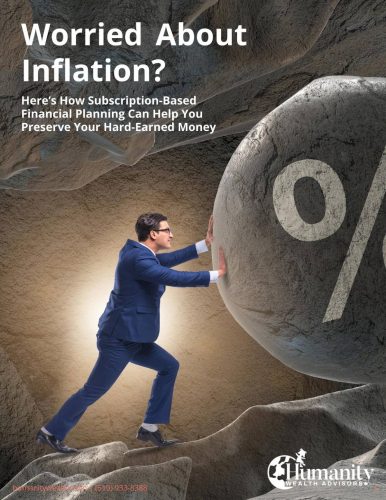At Humanity Wealth Advisors, we understand the need for financial planning during a volatile market, which is why we offer affordable financial planning in the Bay Area. We know that you may be concerned about your retirement plan or other investments, but you can take action now to help have enough money to last into your golden years.
 This quick guide will teach you how to prepare for volatile markets and protect yourself against inflation so that you won’t have to worry about how it will affect your finances when times are tough.
This quick guide will teach you how to prepare for volatile markets and protect yourself against inflation so that you won’t have to worry about how it will affect your finances when times are tough.
As the foundation for your financial health and financial literacy, financial planning is the process of creating and implementing a financial plan designed to reach your desired goals. It’s the action that promotes individual responsibility for one’s financial future and provides a framework for making informed choices in areas such as retirement, insurance, education, tax planning, and estate planning.
Sadly, not everyone has had viable access to professionals for financial help—we are here to change that with subscription-based financial planning!
The Truth About The Financial Planning Paying Field
If you are seeking affordable financial planning in the Bay Area, Humanity Wealth Advisors is especially concerned about serving those who don’t meet the minimum assets required that many advisors have in place. And in such times of uncertainty and economic discontent, people need financial guidance more than ever!
Having a good understanding of your finances when markets are volatile is crucial because you may need to make changes to your budget. This can be especially difficult if you don’t have experience with managing money or do not feel comfortable making decisions on your behalf. At Humanity Wealth Advisors, our goal is not only to find ways in which we can help you reach your financial goals but also to give advice on how best to manage these changes during these times of volatility.
What Are Volatile Markets?
As financial advisors in San Ramon and Newark serving the Bay Area, we understand that volatile markets can cause a sense of panic due to the instability of the economy. This will help you focus on what we can do about it, together.
When we say that the market is volatile, we mean that the value of stocks in the market goes up and down dramatically. For example, if you buy stock in Company A for $10 per share but then later sell it for $5 per share, your investment has lost 50% of its value. This kind of volatility makes many investors nervous about making big investments because they don’t know what will happen to their money next.
 The feeling around volatile markets is similar to how people feel when driving on a winding road at night through mountains or forests: They’re nervous about what could happen if they lose control of their vehicle! In other words, these investors worry that if they make big bets on stocks while markets are volatile—or “winding roads”—they might lose all of their money because there could be an unexpected turn ahead (like a steep drop or sharp curve).
The feeling around volatile markets is similar to how people feel when driving on a winding road at night through mountains or forests: They’re nervous about what could happen if they lose control of their vehicle! In other words, these investors worry that if they make big bets on stocks while markets are volatile—or “winding roads”—they might lose all of their money because there could be an unexpected turn ahead (like a steep drop or sharp curve).
How To Prepare For Hyperinflation
Hyperinflation is a situation where the inflation rate is so high that it makes it difficult to conduct business and even make everyday transactions.
To help your financial confidence in the event of hyperinflation, you can apply these tips to reduce the impact on your household:
- Reduce your spending and budget mindfully: Cut what extra expenses you can.
- Create or save more in your emergency fund: If hyperinflation hits, you have money readily available to pay bills, afford your essential items, and keep paying down debt.
- Invest in things with strong resale value now so you can sell them when they’re more valuable (which will hopefully be the case).
- Keep your liquid cash safe: Keep cash out of a checking account where you make constant transactions.
- Pay down debt with higher interest rates first.
How To Combat The Potential Affects Of Inflation In Your Retirement Plan
To help reduce your financial stress when planning for retirement in volatile times:
- Start with the objective
- Know your goals for the long term
- Define your wants, needs, and wishes for retirement
- Identify your investment buckets
- Craft a diversified portfolio with a professional
As a wealth management financial advisor in San Ramon and Newark, these are some of the most important things our team tells our clients to do regarding financial planning. If you need a second opinion, now is an ideal time to revisit your current portfolio management and comprehensive financial planning efforts.
If you don’t have an advisor you fully trust, it might be difficult for your investments to grow as much as they could. Having a dependable advisor who can help you with your investment strategy is essential because they can help ensure that everything is on track and grows reasonably.
A financial advisor can review your existing portfolio to help determine if there are different investments and accounts that may be better suited to your unique situation.
Financial plans need some flexibility built into them, so talk to a reliable financial advisory firm in San Ramon, like Humanity Wealth Advisors, to help you plan smarter when times are tough. Financial Advisors across the country are constantly reassuring their clients that they have planned for the unexpected. We are here to remind you that economic instability like this is predictable (historically speaking), so planning for it makes perfect sense.
Why Is It Important To Factor Inflation Into Retirement Planning?
Do you know what’s happening to the value of your money not being invested right now? It’s losing value—inflation is eroding the purchasing power of your money. That means if you have $100 in savings today and want to purchase something at current prices, it will cost $110 in ten years.
The effect of inflation can be devastating in retirement since it can cause you to spend more and save less than you need to. Would you feel okay with retiring later than planned due to the lack of resources required for your desired lifestyle?
We don’t want you to have to settle. That’s why getting the financial literacy you need is so critical. To get ahead, you must be informed and know your options. If you need a starting point, ask us about our $50 a month subscription-based financial planning in San Ramon, Newark, and beyond.
How To Plan For Retirement—And A Recession
If you are thinking about retirement, you’re not alone. In fact, per the TransAmerica Center, many Americans have started to plan for their golden years since the age of 27 (median age). Still, it’s essential to know that planning for retirement can be especially tricky when the economy is volatile. The survey also states that 77% of U.S. workers save for retirement through their employer-sponsored retirement plans and other options.
If your employer offers a 401(k) or other retirement savings plan, take steps now to maximize this benefit by contributing as much as possible each month. There are distribution options to consider. If you’re self-employed or otherwise ineligible for an employer-sponsored plan, consider opening an individual retirement account (IRA).
Read: Can an Independent Financial Advisor Help With My 401(k)?
How to Potentially Profit From Inflation – Investment Options
The main goal to keep in mind when trying to profit from inflation is to avoid getting caught off-guard. You want to plan for the worst and hope for the best. Many different investment options can help you do this.
- It may sound strange, but consider market volatility as an opportunity: Instead of worrying about how much you might be losing, think about how much stock you can buy while the market is “down.” Using dollar-cost averaging, you can buy more when the market is low and less when the market is high.
- Stocks: You can invest in individual stocks or ETFs (exchange-traded funds) that track indices like the S&P 500. If you choose individual stocks, talk to an advisor about large companies with a long history of paying dividends so that your investment generates some income from dividends while waiting out market volatility.
- Bonds: Some investors prefer bonds over stocks because they can offer lower risk than equities but still generate cash flow over time as interest payments come due on their face values at regular intervals throughout their lives. Many companies also issue zero-coupon bonds, which means they don’t pay any interest but instead offer a discounted price at issuance since investors won’t receive any payments until maturity, when all principal is returned in full plus accrued interest on top of it!
This can make them appealing even if interest rates rise because these instruments still provide attractive returns even when market conditions aren’t ideal compared with other investments available today.
Working With A Financial Planner Can Be Worth It During Volatile Markets
 Work with a financial planner during volatile markets to help you plan for a recession.
Work with a financial planner during volatile markets to help you plan for a recession.- Work with a financial planner during volatile markets to help you plan for retirement.
- Work with a financial planner during volatile markets to help you plan for inflation or hyperinflation.
Questions For A Financial Advisor During Volatile Markets
You’re not alone if you’re feeling a little nervous about the current market volatility. In fact, it’s nothing new—the global economy has faced periods of extreme uncertainty before.
But while the past might not be a perfect predictor of the future, one thing is certain: Our independent financial advisors can help you navigate these uncertain times.
Here are eight key questions (on top of these three) to ask when you meet with any financial advisory firm in San Ramon you are interested in possibly working with:
- How can I protect my retirement plan against inflation?
- What are the best investment options during volatile markets?
- How can I plan for retirement?
- How can I profit from inflation?
- What is my current risk profile?
- How does this impact my overall portfolio strategy?
- What steps do I need to take now?
- What are some potential strategies that could help me mitigate risk in the event of another downturn?
No matter how much you have in savings and investments, we can help you achieve your goals with personalized financial strategies.
We will work closely with you to develop a plan that considers your current situation, future goals, and risk tolerance. This will help us determine what strategy might best fit your unique situation. We help our clients with retirement planning, college funding, life insurance selection, and precautionary measures against market volatility.
We understand the need for financial planning during volatile markets, which is why we offer affordable financial planning in the Bay Area for all ages. We can help you prepare for a recession and inflation so that you’re not left out in the cold when it comes time to retire or save for your children’s education.
Our team of experienced advisors will work with you to create a customized plan that suits your needs, from developing a retirement strategy to preserving your investments from inflation and hyperinflation—and everything in between!
Content in this material is for general information only and not intended to provide specific advice or recommendations for any individual. All investing involves risk including loss of principal. No strategy assures success or protects against loss.
There is no guarantee that a diversified portfolio will enhance overall returns or outperform a non-diversified portfolio. Diversification does not protect against market risk. Past performance is no guarantee of future results.

